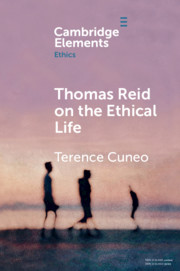Element contents
Thomas Reid on the Ethical Life
Published online by Cambridge University Press: 28 August 2020
Summary
- Type
- Element
- Information
- Series: Elements in EthicsOnline ISBN: 9781108756563Publisher: Cambridge University PressPrint publication: 24 September 2020
References
- 11
- Cited by



